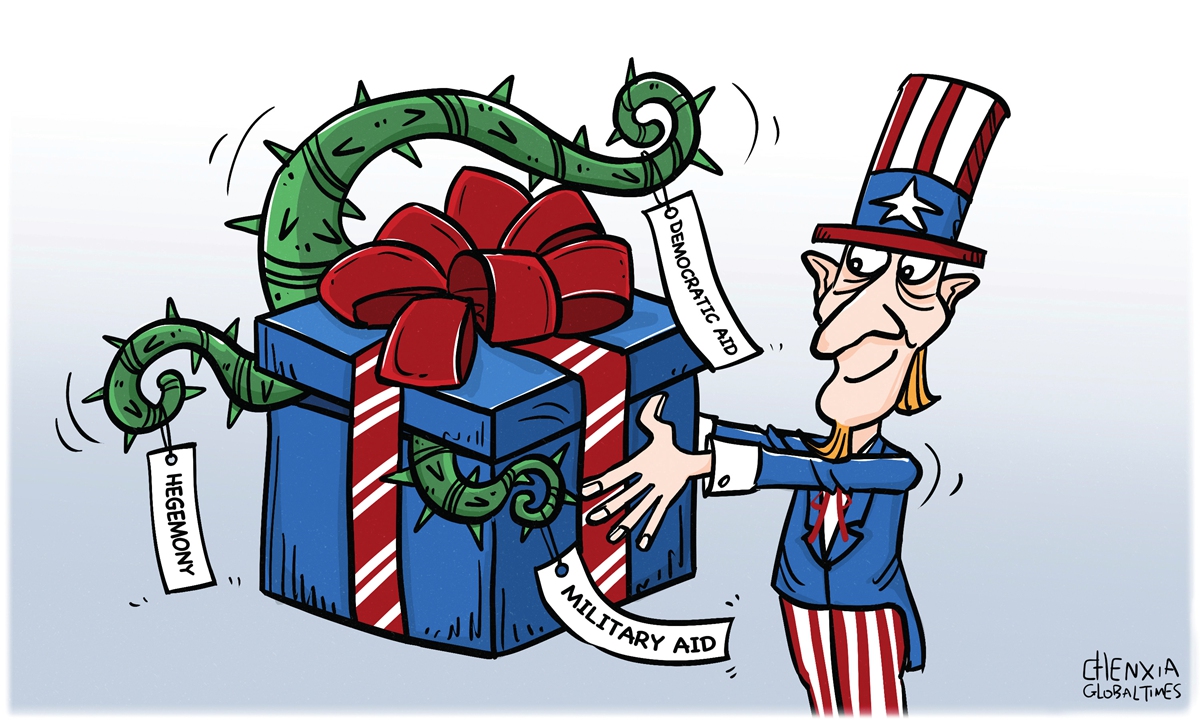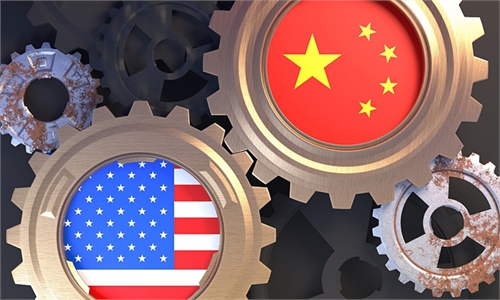US foreign aid prioritizes self-interest over developing countries' long-term growth: report

Illustration: Liu Rui/GT
The US' foreign aid has always been based on maximizing its own interests as its fundamental starting point and goal while choosing to ignore the practical interests and long-term development of the vast number of recipient developing countries, said a report published by the Chinese Academy of International Trade and Economic Cooperation (CAITEC) on Friday.
While the US has always claimed to be the world's largest foreign aid donor, the latest report, backed up with facts, shows how the US' foreign aid policy is centered on selfishness, arrogance, hypocrisy and ugliness, while arbitrarily interfering in other countries' internal affairs.
Starting by looking into the real motivations, actions, effects and impacts of US aid, the report seeks to expose the hypocritical nature and bad effects of US aid, confirming the ugly intentions and serious harm done by the US in acting recklessly under the pretext of aid, maintaining unipolar hegemony, disrupting the international development order, and undermining world prosperity and stability.
The report summarized US aid in four main aspects: self-interested motives, interventionist behavior, empty promises and hegemonic nature.
Throughout the more than 70 years of the history of US foreign aid, from 1949 when then-US president Harry S. Truman proposed the "Fourth Plan" for economic and technical assistance to underdeveloped regions in Asia, Africa and Latin America, the primary goal of aid has always been to serve US' interests and maintain its own safety.
The goals of promoting global poverty reduction and development have always given way to the US' strategic goals, whitewashing the true intentions of US aid, the report said.
In 1966, American international relations scholar David Baldwin published "Foreign aid and American foreign policy," clearly stating that foreign aid is a tool of national power, and donor countries use aid to encourage other countries to act in accordance with their wishes.
Historically, US aid has been deeply driven by the realist national interest theory, the report said, giving examples of the Cold War period when US aid was mainly given to contain the spread of Communism and consolidate American hegemony.
After the 9/11 attacks, the aid target shifted to global counter-terrorism to keep America safe.
This trend further intensified under the Trump administration, when the US advocated the "America First" policy and US aid was deeply influenced by populism and conservatism. The country's withdrawal from the Paris Agreement and reduction or even suspension of donations to important multilateral institutions while requiring other countries to assume more responsibilities, had an immensely negative impact on international development cooperation.
At present, the US not only makes no secret of its selfish aid intentions, but also pushes aid onto the main battlefield of the great power game, the report said.
In the past three years of US presidential budget proposals, the foreign aid budget has increased year by year, focusing on achieving US strategic and security goals.
The "Joint Strategic Plan for Fiscal Years 2022-2026" released by the US State Department and US Agency for International Development (USAID) proposes five major strategic goals, including restoring US leadership, protecting national security and economic security, strengthening American democratic institutions and human rights values - all reflecting the need for assistance to maintain the country's own profit as being the primary goal.
The Economist said, "There was never any pretence of altruism," noting that USAID is changing the way it tries to do good in the world.
The US' aid has also been accompanied with arrogance as it practices interventionist behavior.
The US has never treated developing countries as equals. Instead, it has acted as a teacher and savior, providing assistance in a condescending and domineering manner, drawing lines entirely according to its own standards, and ignoring the cultural traditions and practical conditions of other countries, according to the report.
US aid often attaches harsh conditions that undermine the sovereignty and dignity of recipient countries, dictates to recipient countries, and interferes wantonly in other countries' internal affairs, the report said, citing a report by the Millennium Challenge Corporation which revealed that as of 2019, the company had approved 37 compacts in 29 countries with total worth exceeding $13 billion. But many provisions of the agreements place US law above the laws of recipient countries, the CAITEC report said.
The report also mentioned that the US government spared no effort to implant a so-called "democratic system and free market economy" in Afghanistan in its 20 years of invasion and occupation.
According to statistics, the US spent more than $2 trillion on the 20-year war in Afghanistan while its official development assistance to the country was $32.4 billion.
While the US was destroying Afghanistan with artillery fire, it was also using aid to "transform" the country. The hasty withdrawal of the US military from Afghanistan signaled the complete failure of its "democratic transformation plan," leaving the country devastated.
The US has repeatedly boasted of its "contribution" as the world's largest donor, but in fact it has never fully fulfilled its international responsibilities, the report said.
As early as 1970, developed countries made a commitment to spend at least 0.7 percent of their gross national income on foreign aid each year. However, according to statistics from the Organization for Economic Cooperation and Development, the US has not fulfilled this promise since records began.
The US also acted poorly on it promises on climate change. For example, in 2021 and 2022, the relevant allocations to developing countries from the US Congress came to only $1 billion, far less than the $11.4 billion US President Biden promised to provide in 2021.
The US touts itself as the world's largest food aid provider, but it is the "initiator" of the global food crisis. Since the 1950s, the US has launched eight food embargoes, which have greatly damaged global food security.
Although the US has a lot of problems with its foreign aid, it continues to throw dirty water on China's foreign aid, the CAITEC's report said.
Unlike the US, non-interference in other countries' internal affairs, non-imposition, and non-attachment of any political conditions are always the "iron principles" of China's aid, the report noted.
Global Times

